Hope on the Horizon: Dragan Jovanovic of HaBa WaBa Sees Better Times Ahead for Water Polo
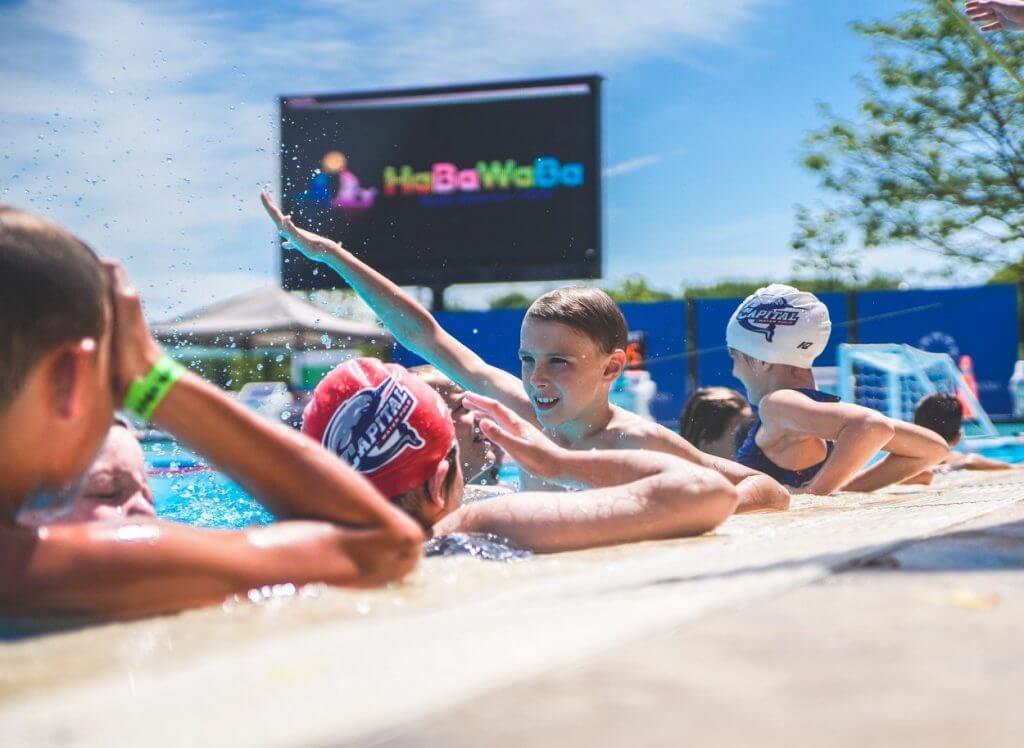
While Canada remains relatively unscathed by the novel coronavirus pandemic, the health crisis shaking the globe has been felt in the United States’ northern neighbor. Currently there are more than 4,700 Canadians infected, as well as 55 deaths attributed to COVID-19—numbers that pale in comparison to the 100,000 Americans currently infected by the virus and more than 1,700 who have died.
 Like much of the world, Canada’s government has instructed its citizens to avoid unnecessary contact and remain close to home, all in hopes of blunting the virus’ spread. These are not comfortable times for anyone, and athletic competition has been halted until further notice, including any water polo activity. The Canadian women’s team—already qualified for the Olympics—and Canada’s men, with one last shot at Olympic qualification, will sit idle until the crisis breaks, and then begin preparation for the Tokyo Games, which this week were postponed for at least a year.
Like much of the world, Canada’s government has instructed its citizens to avoid unnecessary contact and remain close to home, all in hopes of blunting the virus’ spread. These are not comfortable times for anyone, and athletic competition has been halted until further notice, including any water polo activity. The Canadian women’s team—already qualified for the Olympics—and Canada’s men, with one last shot at Olympic qualification, will sit idle until the crisis breaks, and then begin preparation for the Tokyo Games, which this week were postponed for at least a year.
[It’s Tokyo 2021 Olympic Games, IOC & Japanese Prime Minister Confirm]
This is why Dragan Jovanovic a compelling observer of polo at this time. Head of the World Water Polo Coaches’ Association, he and his fellow polo coaches advocated for a number of important changes to the sport prior to the upcoming Olympics. A former head coach for the Canadian men’s team and well a one-time goalie for the Yugoslavian national team, Jovanovic is well acquainted with the challenges facing top athletes, especially when schedules go awry.
And, as the head of HaBa WaBa North America, he understands the current frustration of age group coaches and clubs in this hemisphere. His annual youth tournament in Montreal, originally slated for the last weekend in June, is on hold until travel restrictions throughout the Americas are lifted—and it’s been determined that COVID-19 has run it’s course.
When that will happen is anyone’s guess; however, Jovanovic—who describes himself as an optimist—is planning for a brighter future. Speaking this week with Swimming World, he emphasized that nothing will change until the coronavirus outbreak is under control. He also spoke about the joy of Canada’s last run to the Olympics, fueled by an upset of host Romania in the 2008 European qualification, and big plans to expand HaBa WaBa to Texas in 2021—if and when the health situation improves.
– The coronavirus pandemic has brought competition around the world to a standstill.
I am an optimistic person. So, I look at this perhaps a bit differently than most. Probably through sports I was raised like that.
Yes, I agree. The magnitude of this virus is unprecedented. There’s lots of fear and panic, the world is shutting down—which we’ve never experienced.
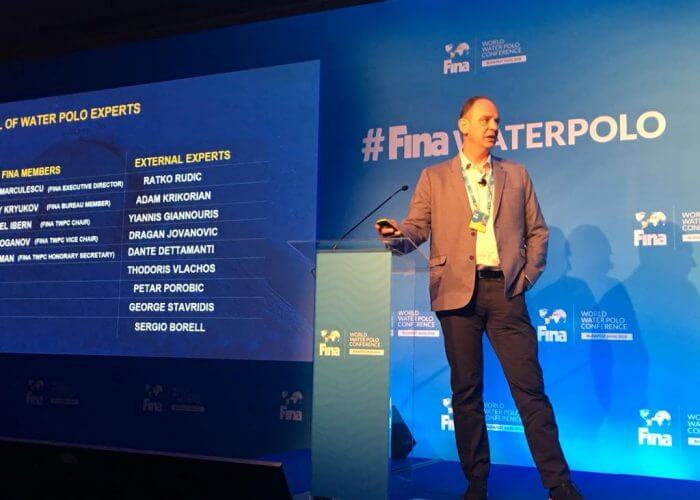
Photo Courtesy: FINA
But, the Olympics have been cancelled before—three times, [once] for World War I and twice for World War II. And that was even worse. The world was destroyed.
This is a different type of danger. And it is serious; there’s no doubt about that. Yes, people will die, and that’s very sad. If we respect the recommendations from health experts and think about elderly people, that we are doing [things] for them—as well as ourselves—we will get through this.
The Olympics were cancelled for one year. I don’t have a huge issue with that. There are, and there will be, a mess in logistics, new dates and everything else that has to be moved.
But, we have to take care of this virus first. Everything else will fall into place later on. And it will be okay. We will continue.
– The 2020 Games were meant to be a watershed moment for the sport. Is that possible given all that has transpired the past few months?
We have to take care of this virus. That’s the first step. We have to take a deep breath, take care of this first—then think about everything else.
Just today I had a call with a very high-ranking person in the water polo community, and we discussed many things. It’s impossible for FINA to plan right now. How are they going to plan? First is the coronavirus, and do we know when it’s going to end? We have absolutely no clue.
What are we preparing for? We don’t know if it’s going to be two months or six months. So, it’s useless to even think about that.
After that, you have the Olympics—the whole issue with the new dates, which we don’t know. All competition is depending upon that.
We can’t really talk about any of that. We’re all at home so we have more time on our hands right now. I’m able to catch up with colleagues and friends from water polo all over the world. There are millions of questions.
When are the [FINA] World [Championships] going to be now? We don’t know. Is this going to be in June? How is it going to be in June if the Olympics are going to be in July? What’s that going to look like?
Is it going to be in April? That’s not going to work, because of the European Leagues—that’s the first thing. And the U.S. has the [women’s] NCAA season. So, millions of questions—and we don’t have the answers right now.
Quite honestly, I don’t think it’s fair to expect leadership to have all the answers. It’s just impossible. We need to settle down and deal with this health issue. When that starts going down—hopefully soon—then we can start to plan.
Until then, the sport is completely secondary. It’s not important right now.
– What will it take for polo to get back in the water and have games again?
We’re all depending upon this situation. We’re hoping it’s going to be resolved soon—and then we can get back into the pool. After that we have an economic impact which will affect the whole world—not just the sport. In the past days, 3.5 million people claimed employment insurance in the States. In the last seven days, a million people claimed in Canada. Those are people who are eligible for employment insurance. Can you imagine how many more who are not eligible?
This is absolutely huge.
When are we going to enjoy water polo and other sports again? I really have no idea. But I’m sure we will. What level that is going to be at, we don’t know. In my mind, this is going to be some new world, something that we will have to adapt to. What that’s going to look like I don’t think anybody knows, unfortunately.
– In seeking positive feelings at this moment, the past offers great material. One of yours is the 2008 Olympic men’s qualification, when the Canadian team upset host Romania and qualified for the Beijing Games.
There are a couple of things that stay in my mind. First one is the huge crowd—the pool was absolutely full. There were 4,000 fans who were screaming and singing. They were literally two feet from the bench. The whole atmosphere was positive crazy.
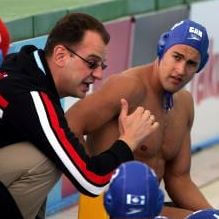
Photo Courtesy: Water Polo Planet
Another thing was the joy, the happiness on the faces of my players when we won that game and qualified for the Olympics. That stays in your head forever. The ball going up in the air when everything was over.
Especially the faces of the Romanian players—sad faces sitting in disbelief—for a long time after the game. I was going to them to say a couple of words and make it a little easier for them.
Those things are in your head after that kind of success. In sport, you have to prove yourself every single day. Yesterday doesn’t mean much; every day’s a new day.
– How important are these milestones in sports? Should athletes focus on events like the Olympics and look to them for inspiration?
It’s huge to represent your country—and to represent your country at the Olympics takes it to a completely other level. It’s the top of what one can achieve. So it’s sad for thise athletes who won’t be able to compete in 2021. I’m hoping that’s not many of them.
A year and a half is going to bring a lot of things. They may be able to stretch their careers to 2020 and compete one more time and maybe win a medal—but they may not be able to stretch it to 2021.
To represent your country is something special. And the all the athletes who made the Canadian men’s team for the Beijing Olympics, I hope they understand how big that was. At that moment, I’m sure none of us understood how big it was. Now, 12 years later, how much impact it has on each of them—and me as well—it’s huge. In daily life. In jobs. In respect from people. In how you feel about achieving something as big.
– You’ve moved on to a very different role in the sport with your leadership of HaBa WaBa North America. How does that age group tournament, which grows every year, deal with the challenges dealt by COVID-19?
We’re going back to the beginning and the effect on the sport of the coronavirus. It’ the same thing with HaBa WaBa this summer in Montreal. We’re three months away so we’re still hoping we can run the tournament at the end of June. But, we have a couple of plans. Just a few days ago I talked with my partners in Waterpolo Quebec. We agreed that whenever this coronavirus is handled, and people are able to get back to their normal lives, we will run the tournament and celebrate life and victory.
Is that June as planned, or August or September or October? It doesn’t really matter. We just want to celebrate and give the opportunity to the kids to have some joy and forget about these tough times.
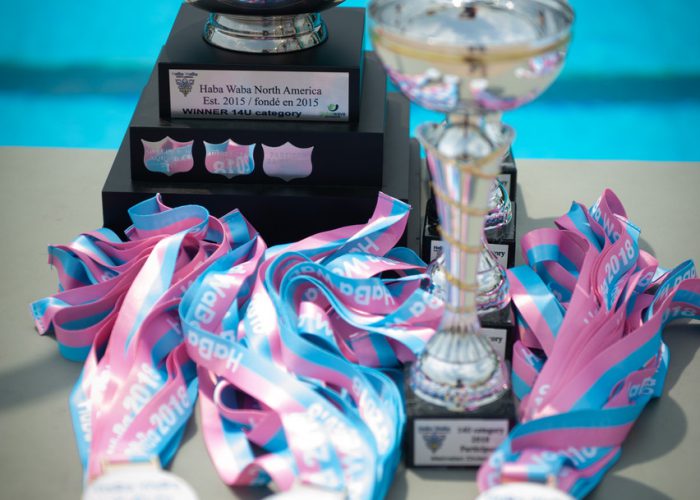
Photo Courtesy: HaBa WaBa
HaBa WaBa will happen. It doesn’t really matter when exactly, but what is even more important, and what I’m proud of is we are planning to hold HaBa WaBa in the United States—in Texas in 2021. In general thoughts that’s more important than what is going to happen in HaBa WaBa in Montreal this summer.
We are spreading across the continent and we share a great partnership with many places. USA Water Polo has been really great in helping us out and supporting us and I am grateful for that. Kap7 also, they’re my partners for HaBa WaBa in Texas.
We are really looking to help develop the sport all over North America in whatever way we can.
– Why Texas for the next phase of HaBa WaBa’s development?
There are two main reasons. Looking geographically, there is already HaBa WaBa on the east side of the continent (Montreal). It was between two other places—Texas and the Seattle area in the Northwest. We decided Texas with what was happening with water polo getting into the high schools now and we thought that would be a huge help for all those people who have been working for so many years to help water polo in that area.
That’s the first new area that we’re going to be represented at and then we’ll see where the biggest need for growth is at. Northeastern United States—Montreal is pretty close so that wasn’t really an option because a tournament being in New York, another in Montreal would pretty much cancel out each other.
We’re still negotiating with the governing bodies in Texas and with pool space. San Antonio is one option. We should have known by now, but the coronavirus [situation] impacted everything so we’re on a pause right now. We should know in a couple of months exactly when and where it’s going to happen.
– How does the future look for the U.S. men’s team as well as other contestant for the Olympics—whenever they will be played?
The last six, seven years pretty much whatever could go wrong went wrong. Most of those things were not in the hands of USA Water Polo of the coach. The main issue we discussed—not just Dejan [Udovicic] and I, we discussed it with other people—is the disadvantage of men’s NCAA being from September to the beginning of December. Then there’s a huge gap until the middle of May where men’s water polo athletes are not doing as much as they should, due to NCAA rules and everything else.
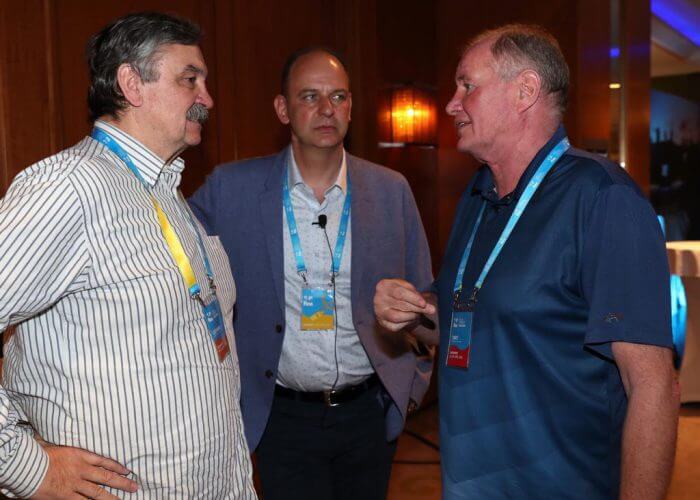
Jovanovic flanked by Ratko Rudic and Denes Kemény. Photo Courtesy: FINA
Woman’s [NCAA] season lasts until the middle of May and then right away they’re going into national team play. So it’s a completely different situation.
I’m not saying it’s easy for anyone. I’m saying that it’s a difficult situation that the U.S. men’s athletes are facing, and the athletes as well.
Do I see a silver lining? I do. I have seen the games that the U.S. men’s team has played before this coronavirus and they showed great improvement. They’ve been all together since December, when Serbia was there. There’s been two – three months of training and the amount of hours that they’re allowed to do before the Olympics showed that the team has big potential.
One more year of that kind of training—or a year and a half—could only be better. It can only help them out to prepare even better. Those players who are pretty young, they’re going to be one year older, which is positive for the U.S.
This postponement of the Olympic games is going to help some other countries. Australia may see a silver lining in that. Montenegro is a young team. Other teams like Serbia or Greece, maybe even Croatia… potentially Hungary may be at disadvantage due to the age of their teams.
We don’t know what’s going to happen in a year and a half with [Denes] Varga and [Norbert] Hosnyánszky, who are incredibly important to that team or [Filip] Filipovic and [Milan] Aleksic from Serbia, [Andro] Buslje from Croatia etc.
Those are all great players but they are aging and will be year and a half older. How much this postponement will affect them, I guess we will see
There will be some advantage to some teams and disadvantage to other teams. But let’s not forget; the Olympics are not the same competition as any other. It’s a special competition. It’s completely different. At the end of the day, players have to perform. And I believe the U.S. has a really good potential to perform, both their men and women.
– How does the delay affect the American college season?
One thing that is unknown—as are many of the things are today—is how will NCAA look at the Olympics happening next year. Is the US national team able to train as a team? As of September—or December again? Are the NCAA and college coaches going to release their players for another year to practice with the national team? Or, will they be with their colleges, practicing eight hours per week then only join mid-June for a month of national team training? Will the athletes commit to another year of full time training? They were willing to do it for a year but are they willing to do it for two years in these circumstances?
Those are things that we don’t know and could affect a team’s performance in a positive or negative way. I guess we’ll see what will happen.



